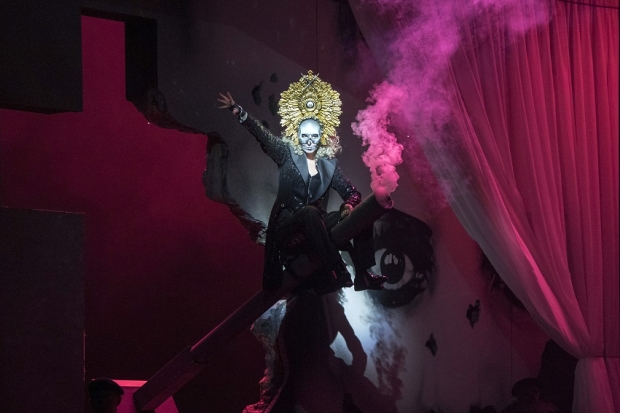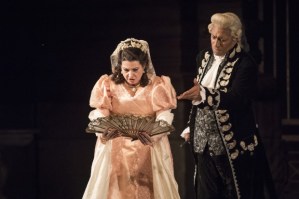Review: La forza del destino (Wales Millennium Centre and tour)
WNO’s new production of Verdi’s massive opera is a musical triumph

© Richard Hubert Smith
How do you solve a problem like La forza del destino? Verdi’s sprawling tale, Les Mis meets War and Peace on a sea of coincidence, is arguably the trickiest to stage of the three mid-life leviathans that Welsh National Opera is set to tackle, with Un ballo in maschera to follow in 2019 and Les Vêpres siciliennes in 2020. The Verdi trilogy is being staged by WNO’s paterfamilias David Pountney on shared set designs by Raimund Bauer.
Only time will tell if Bauer’s bulky pair of double-sided screen trucks cut the mustard for the other operas. Here they are both limiting and liberating – the former because the opera’s spectacle is sometimes attenuated, the latter because Pountney finds so many brilliant ways to subvert their constraints.
The Force of Destiny begins with a stray bullet from Don Alvaro’s gun. It kills the father of his lover Leonora and ignites hate in the heart of her brother, Don Carlo, thereby unleashing a picaresque adventure of hunter, hunted and haunted. Across many years the opera rambles through a chaotic parade of assumed identities, wartime injuries and monastic hideaways before the inevitable showdown.
Pountney answers my opening question in his intelligent if occasionally frustrating staging by tying up the opera’s frayed ends. This he does with seasoned ingenuity. He doubles the role of Leonora’s dad with that of the priest from whom she seeks salvation – a simple device that suggests she sees the man of God as a father figure and that she still reveres her true parent’s memory.
'A world-class assumption'
Not even that clever idea is as inspired as the trick he plays with Preziosilla, a gipsy girl who frustrates the early stages of Don Carlo’s search. Fabulously sung and acted with dazzling physicality by the Lithuanian mezzo Justina Gringytė, this marginal character is expanded into a manifestation of the opera’s very title. As an agent of destiny she not only doubles as Leonora’s maid, she even frames the opera with the three solemn knocks, 'les trois coups', of ancient stage tradition. They fit the orchestra’s fate motif unnervingly well.
Carlo Rizzi‘s conducting of Verdi’s revised score is conceived on an epic scale and he led the WNO Orchestra and Chorus in a frankly sensational account. The cast, too, is one of the strongest that the company has fielded of late. With her rich, intense soprano, Mary Elizabeth Williams wrung every ounce of tragedy from Leonora’s troubled life. Hers was a stellar performance. Luis Cansino matched her as her darkly obsessed brother and Miklós Sebastyén illuminated the twin roles of the Marchese and Padre Guardiano.
It was Gwyn Hughes Jones, however, who stole the honours even from these illustrious colleagues. The tenor is at the peak of his powers just now and his Don Alvaro, plangent yet heroic, tragic yet determined, was a world-class assumption.
Some of Pountney’s expressionistic ideas rankled slightly, not least the tiresome trope of obsessive-compulsive blood-smearing, while his decision to showcase stagehands in full headphone regalia mitigated against the easy suspension of disbelief. Nevertheless, with so much else to celebrate I’d urge you to catch this rare epic on its travels – and let destiny take its course.
La forza del destino plays in repertory at the Wales Millennium Centre until 17 February, then tours to Birmingham, Southampton, Plymouth, Milton Keynes, Bristol and Llandudno until 21 April.













